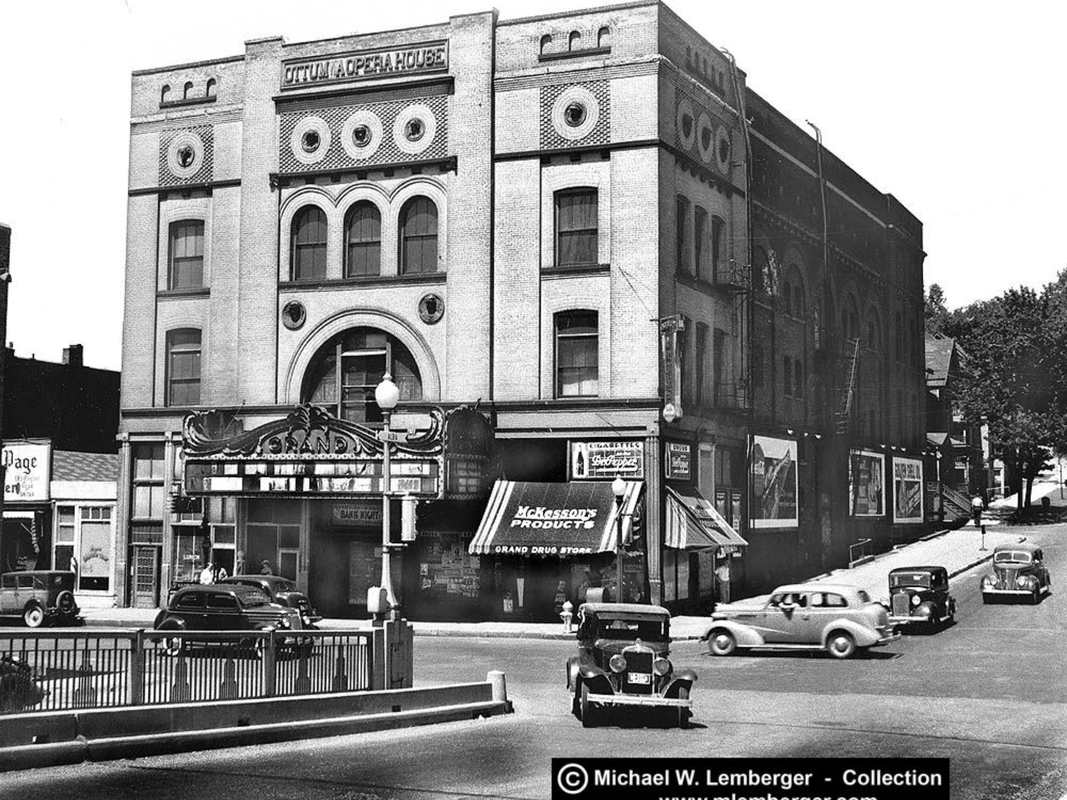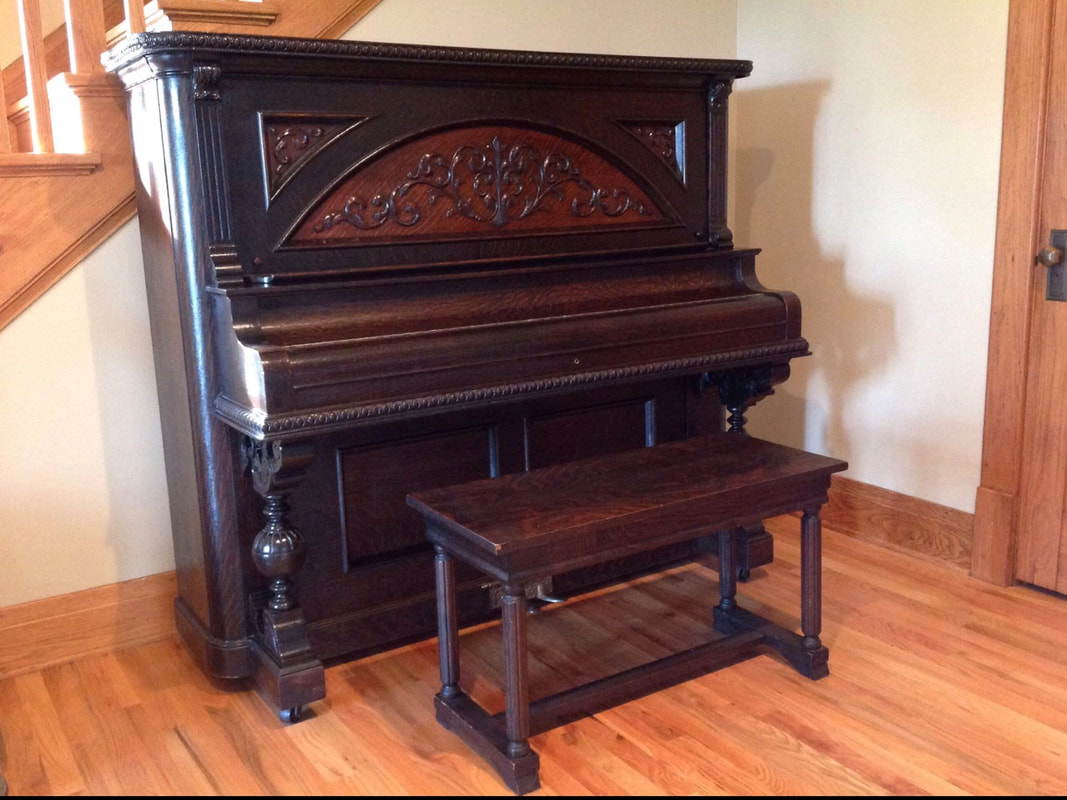Tom Palen,a broadcaster, pilot, writer, and our Guest Columnist! Archives
July 2024
Categories |
Back to Blog
The 1906 Ellington12/23/2021 I went to an estate auction just to see what was there. It was July, and it was hot. A couple of items interested me, but I wasn't sure I wanted to wait for them to come up for bid in the heat. So, I went inside the house to see what was there, but mostly I was hoping to find some air conditioning to escape the hot weather.
I fell in love the very moment I saw it on the east wall in the living room. I knew it would probably sell cheap because people don't want these big old things. Most folks consider them an albatross; they just want to buy the bench or the stool. So, I decided to stay and wait for it. A few hours later, the auctioneer said, "What we have here is an antique piano and bench. We'll be selling them separately, starting with the bench. Whoever buys the bench can have the piano if they want it; if not, we'll sell the piano next." The piano was gorgeous, an antique upright-grand. The unique rounded corners made of dark quarter-sawn oak, the wood carvings on the sheet music boards, the sculpted legs, and hand-carved beading on the edges made this a breathtaking piano. The center keys had been replaced with modern plastic, but the original ivory keys remained on high and low notes. The piano bench was nothing special; a late sixties piece of furniture that did not match the piano. Jim, the auctioneer, asked, "Who'll give me two hundred to open." Auctioneer's always start high. He chanted a few seconds, then asked for one hundred. A man called out a bid of two dollars and fifty cents. "We've got two and a half; who'll give me five?" I raised my hand. The other bidder rapidly went seven-fifty; I raised my hand for ten. He took twelve and a half, and I nodded my head for fifteen. The other man bidding, looked at me and said something obscene, then walked away; it shocked me that he said it. No one else was bidding; Jim paused his auction cry, glanced over the crowd, then announced, "Sold for fifteen dollars," I held up my card, "to number one-seventeen." Then he addressed me, "Tom, do you want the piano or just the bench?" I laughed; Jim knows me, "All I wanted was the piano, but I'll take both." The other man who was bidding approached me, asking if I wanted to sell the bench. "Sure, twenty-five bucks," I said with a smug tone. I could tell he was annoyed with me, "You only paid fifteen." "Yeah," I replied, "but then you said what you said to me, and if that isn't worth ten bucks, I don't know what is." The man glared at me briefly, then repeated his rude comment. "The price just went up to fifty," I said to him as he turned away; in the spirit of a live auction, I added, "Do I hear more?" I bought several cool items that day – the piano was the prized treasure among them. When I got home, I told my wife I had purchased a baker's cabinet, some other things and then told her about the piano. "It's going to look great with that antique piano bench you bought in Winona." She asked where I would store it since we were still finishing the remodeling of our home. "Oh yeah," I casually mentioned, "I bought the house, too. I'll keep it there for now." (That's another story that didn't end as well.) The piano sat in the house for a few months; I wanted to move it to our home, ready to play before Christmas. So, I called a man named Paul Kennedy, a piano tuner. I was told Paul was a real enthusiast for old pianos. "I'll come right over," he said. I explained the house didn't have any utilities connected, and it was dark. "I have a flashlight on my phone," he said, determined to come that evening, "I can be there in ten minutes." "You better give me thirty minutes," I told him and hung up the phone. When I got to the house, Paul was pacing on the front porch. After a brief introduction, I unlocked the door. Paul rushed right in to look at the piano. "Holy cow, this is amazing," were his first words. He ran his hands over the top and the sides. "I can't believe this," he said, then opened the keyboard and played a few notes. "It's not far out of tune," he said, then pulled the piano forward to look at the soundboard, "Do you have any idea how cool it is to find this complete? I usually find pianos like this in pieces in boxes and baskets." Now, I was in love with this piano at the very first sight, but Paul's excitement made my affection seem like puppy love. "You need to get this moved into a warm space; the cold, dry air isn't good for it," Paul said. He wrote down a few notes, including the serial number, and promised to be in touch soon. Less than an hour passed when I received a call from Paul. I barely said hello, when he started, "Your piano is a 1906 Ellington, upright grand. Ellington is an upscale piano built by Baldwin in Chicago…." Paul finally took a breath and asked, "Can I come to see it again in the daylight on Thursday." Of course, I agreed and told him to call first. By Thursday, the piano had already been moved into our house, having a couple of days to acclimate. Paul sat down and started playing lightly. "It's really held its tune well." As he played, I could see the dust floating in the sunlight coming through the front windows. Finally, he stood up, "Can I ask what you paid for the piano?" "I gave fifteen dollars for the bench; the piano was free," I told him. "This piano, restored, is worth about twenty-six thousand dollars on the west coast when sold by a reputable dealer." Paul handed me a card, "This is a friend of mine; he's a collector and a dealer. He'll give you six thousand for it, sight unseen, based on what I've told him – but now that I've seen it in the daylight, he'll give you at least eight." "The piano isn't for sale," I told him, "It has a history here in Ottumwa, and I'm going to keep it." Then I told Paul I wanted him to clean it up and tune it. It was terribly dusty inside. Paul made a clicking noise and pointed at me, "That's what I wanted to hear." Before I knew it, he removed the movement and keyboard from the piano cabinet and carried them out to his car. "Wait a minute," I said with concern. "How much is this going to cost me?" Paul just laughed, "It'll be very reasonable. Trust me; I am more interested in seeing this Ellington play again than a paycheck. I'll be back on Monday – say three in the afternoon?" Paul returned on Monday bringing in the keyboard first; he had removed the white plastic tops from the center keys and replaced them with natural ivory from other antique pianos he'd collected for parts. Then he pulled the toe board, got down on his hands and knees, and started cleaning with tiny brushes and a vacuum. When he finished cleaning, he reassembled the piano, sat on the bench, and began to strike keys. Next, he used a tool to turn pegs, tuning the piano. Then, when he finished, Paul started playing the piano with enthusiasm and spirit – It was magnificent! When I remodeled our house, I removed all the carpet and refinished the hardwood floors. Any floors that weren't wooden were ceramic tile. The entire house became part of the instrument with all the hard floors. The sound resonated from room to room; it was music unlike any I'd ever heard from a piano before. I was absolutely in awe at the sound and the tone of this piano that was over one hundred years old. Then I told Paul some of the Ellington's history. "Delilah was the name of the lady who owned the piano. I talked to her sister, Dorothea, who lived next door, and she told me a lot of stories: "It's a fabulous instrument, an upright grand, you know." I smiled and continued listening. "The piano came from the Ottumwa Opera House; they bought it new. Then, in the early twenties, they traded it in for a full-sized grand piano at that music store next to the South Side Drug. Dad bought the piano, used, for Delilah to learn to play. She was pretty young then. “The piano company delivered it and set it up on the west wall. Dad insisted the piano be kept perfectly tuned, so he had the tuner come by once a month to check it. Everyone in our family was a musician, so when Dad saw the tuner walking down the sidewalk with his case, he called for Mom and us girls to come to the living room. A few neighbors and friends would see him coming, and they came to the house with their instruments too. After the tuner looked over the piano, we all started playing. It became a regular event for people to gather at our house on Sunday evening for a music jam once a month. Other people came just to listen. The piano never seemed to need much tuning; we figured Dad just wanted folks to get together for the music. I think the piano tuner wanted the same thing because he never charged Dad to tune the piano. "Several years back, I was over visiting Delilah; she said to me, 'help me move this piano to the other side of the room.' I told her I would not; I said, 'Dad had them put that piano on the west wall. It's been there for over eighty-five years, and that's where it's going to stay.' Well, a while later, I was back at the house, and I'll be darned if that piano hadn't been moved to the east wall. So I asked Delilah, 'who moved that for you.' I kept a close watch on my sister. I didn't see anyone going in or out of her house. Finally, Delilah told me she moved it herself, a few inches at a time until it was on the east wall. Can you imagine that? That woman, at ninety-one years old, moved that piano across the rug no less until it was where she wanted it." Dorothea's eyes were welling, and she changed her tone of voice, "Well, I suppose that's just stubbornness for ya." She went on to say, "Dad built that house in 1917 – my sister and I were just babies when we moved in. I suppose Delilah was about six years old when Dad bought the piano." Dorothea paused as she reminisced. "She lived there her whole life and never did marry; that piano was her love." Her eyes were welling up thinking about her sister; Dorothea said, "You best be going now; I need to fix some supper." When Paul had finished tuning and playing the piano, he stood up, motioning for me to take the bench, "Sit down, play it; tell me what you think." I blushed, "I don't play the piano; I always wanted to, but I don't." "Oh, your wife plays?" I told him she did not. "Do your kids play?" I said they do not. Paul seemed confused, "If no one in your family plays, why do you want a piano?" "Because I like to cook," I answered, leaving Paul more baffled. "How do you cook with a piano?" "I don't cook with the piano," I replied. "I cook a nice meal and invite people who can play to come to dinner. Then, when we've finished eating, I hand them a ticket and tell them, 'Pay or play – nobody eats for free.'" We shared a good laugh about that. We said our farewells, and Paul went on his way. One day, I decided to go through the piano bench. I knew there was some sheet music and such in there; I wanted to clean it out and probably get rid of the bench. I found several pieces of music that Delilah had composed. "Maybe I'll keep these with the piano," I thought. Next, I found a couple of letters addressed to Delilah from John; each letter had a military return address. I opened the first letter; it was handwritten: "My dear, sweet Delilah…." My heart melted at the greeting. The letter went on; "I tested out in the military, so they'll be teaching me a trade. When I get home from the war, I'll have a skill, so I can get a good job to provide for you, if you’ll marry me one day, and start a family." His letters were the sweetest love letters I'd ever read. I took the letter to Dorothea, asking if she wanted them. "No, they should stay with the piano." Maybe she had seen the letters before. She went on to tell me, "Johnny never came home from Germany. Delilah never married, never even courted. The piano would be my sister's only love for the rest of her life." The story moved me very much; enough to go home and start planning. I called a friend of mine, a wonderfully talented pianist, to invite him and his wife, Marta, to a dinner party. I told Michael, "Be sure to bring cash or a good variety of sheet music to play; nobody eats free around here." I also invited Dorothea, arranging to pick her up and drive her back home. She seemed excited to come for dinner and hear the piano being played again. I was looking forward to hearing more of her stories. The day before our dinner, Dorothea called me, "I'm afraid I can't make it tomorrow evening." I offered to postpone the event for her, but she declined. "I just can't..." she paused. "I just can't hear it played by anyone else. I'm sorry." That was the last time I spoke to Dorothea. I tried several times to call her but only got the answering machine. Dorothea passed away within a few years of her sister. It was a difficult decision, but we left the piano in Ottumwa when Melissa and I moved to the north shore. We sold it to a young man who had a sincere interest in Ottumwa and the area's history. With his strong appreciation for the piano and its history, we were confident we left the piano with the right person. Every time I look at a picture of the Ellington, I recall all of the love stories it holds. The love from their dad, the piano tuner, the neighbors, and friends. I feel the love between Dorothea and he sister, Delilah. I feel the love and hope in Johnny's letters, and I share Delilah's pain when Johnny didn't return from the war. I understand her true passion for the piano that became her lifetime love. I also feel the love, joy, and appreciation of the young man who owns it now. For well over one hundred years, every note of every song played on that piano has entertained and comforted many. There is no doubt in my mind it will continue to do so for another hundred years.
0 Comments
Read More
Leave a Reply. |

Contact Us:
Phone: 507.238.9456
e-mail: [email protected]
Photo Press | 112 E. First Street |
P.O. Box 973 | Fairmont, MN 56031
Office Hours:
Monday-Friday 8:00 a.m. - 4:00 p.m.
Phone: 507.238.9456
e-mail: [email protected]
Photo Press | 112 E. First Street |
P.O. Box 973 | Fairmont, MN 56031
Office Hours:
Monday-Friday 8:00 a.m. - 4:00 p.m.
Proudly powered by Weebly



 RSS Feed
RSS Feed

